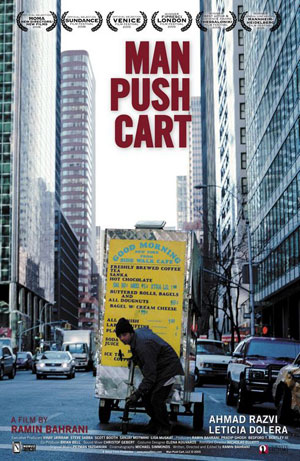 What’s your tolerance for misery? Man Push Cart aims to explore how much misery you can take – this little independent film is almost oppressive in how sad it is, and it often comes very close at times to becoming a complete bummer or a maudlin pile of crap. It never quite does, a testament to the skill of writer/director Ramin Bahrani and his cast of unknowns.
What’s your tolerance for misery? Man Push Cart aims to explore how much misery you can take – this little independent film is almost oppressive in how sad it is, and it often comes very close at times to becoming a complete bummer or a maudlin pile of crap. It never quite does, a testament to the skill of writer/director Ramin Bahrani and his cast of unknowns.
There’s a common sight in the city of New York – breakfast carts, usually tended by Middle Eastern men. They are there on the street corner before dawn, with pre-made bagels and coffee, and they’re there until the lunch rush. Like so many elements of the service economy they’re easy to not think about – you get your bagel and coffee (often for a truly great price), make a touch of small talk, and move about your day. I have done it on many mornings.
Man Push Cart brings us inside the life of one of these vendors, Ahmad. He gets up when it’s still dark and pulls his cart through the never-quite-empty city streets, dodging buses and potholes. He sets up shop and sells coffee and muffins and bagels and then returns the cart to a centralized depot; after that he walks the streets selling bootlegged Indian porn to other young Middle Eastern men in the service industry who look like they might be lonely for home. All the while Ahmad carries his refillable propane tank. He returns home well after dark to get a few hours of sleep before beginning it all again.
Ahmad wasn’t always busting his ass like this – back home he was a rock star, the “Bono of Lahore.” He came to America and his wife died, and his six-year old son is in the custody of her parents, who blame Ahmad for her death and almost never let him see the boy. He’s working hard to save money to buy his own cart so that he can make real money and have his son come live with him again.
During the course of the movie, Ahmad makes three connections that have the possibility of changing his life. He meets a fellow Pakistani who has come to America but has done much better for himself, working in finance. He hired Ahmad to do work on his apartment before he recognizes the ex-singer. He promises to help Ahmad get back into music – but while still using him as cheap labor to paint his house. Ahmad also meets a pretty young Spanish girl who works at a local newsstand. They have the tenuous beginnings of a romantic relationship, one that he can’t help but undermine with his own self-destructive tendencies. And finally Ahmad meets a mewling little kitten that he takes home to care for.
At the point that the kitten was introduced Man Push Cart almost lost me – kittens and puppies are universal signifiers of “awwww,” and are easily used to bring out cheap emotion. When it turns out that Ahmad can’t care for the kitten and it dies, the film teeters right on the edge of being maudlin, but that’s just the beginning of a long run of shitty luck for Ahmad that ends up with the movie in resolutely devastating The Bicycle Thief territory. As the calamities keep piling on Ahmad you almost lose the ability to feel bad for him and just have a sickness in the pit of your stomach.
In other words, no, Man Push Cart is not the feel good film of the year. It won’t be re-affirming your belief in mankind. And it’s a really shitty date film. But it is the kind of film that will re-affirm your belief in cinema as a storytelling form that isn’t just about reinforcing our desire to be happy cogs in the machine. Man Push Cart is about a guy who is working really hard and not getting much out of it – something that’s familiar to millions of Americans.
Some critics have talked about how the movie doesn’t do more with its stranger in a strange land immigration themes, but I think that Bahrani has done the right thing here. While Man Push Cart is a peek into an interesting world, it’s also something that can be completely understood by the Midwestern mom working two minimum wage jobs while still living below the poverty line. It would have been interesting to see how Middle Eastern men in service work deal with the post-9/11 prejudices that seem to be so prevalent, but that’s not this story.
Ahmad Razvi, once a real coffee cart vendor, plays Ahmad with a haunting sparseness. Ahmad doesn’t have a lot to say throughout the film, but Razvi’s eyes are filled with pain. It’s an affecting performance from a first time actor. Also fantastic is Leticia Dolera as Noemi, the Spanish girl. She’s a study in fragile beauty, trying to reach out and connect with someone in the emotionally cold city, and it would be Ahmad if he would let her.
That’s the basic tragedy of Ahmad’s life: the system keeps him down, always running in place to catch a carrot that will never be in his reach, but he sabotages his own little happinesses as well. Ahmad is victim and victimizer in equal parts, and it’s that self-destructive dichotomy that makes him, and his story, so relatable.